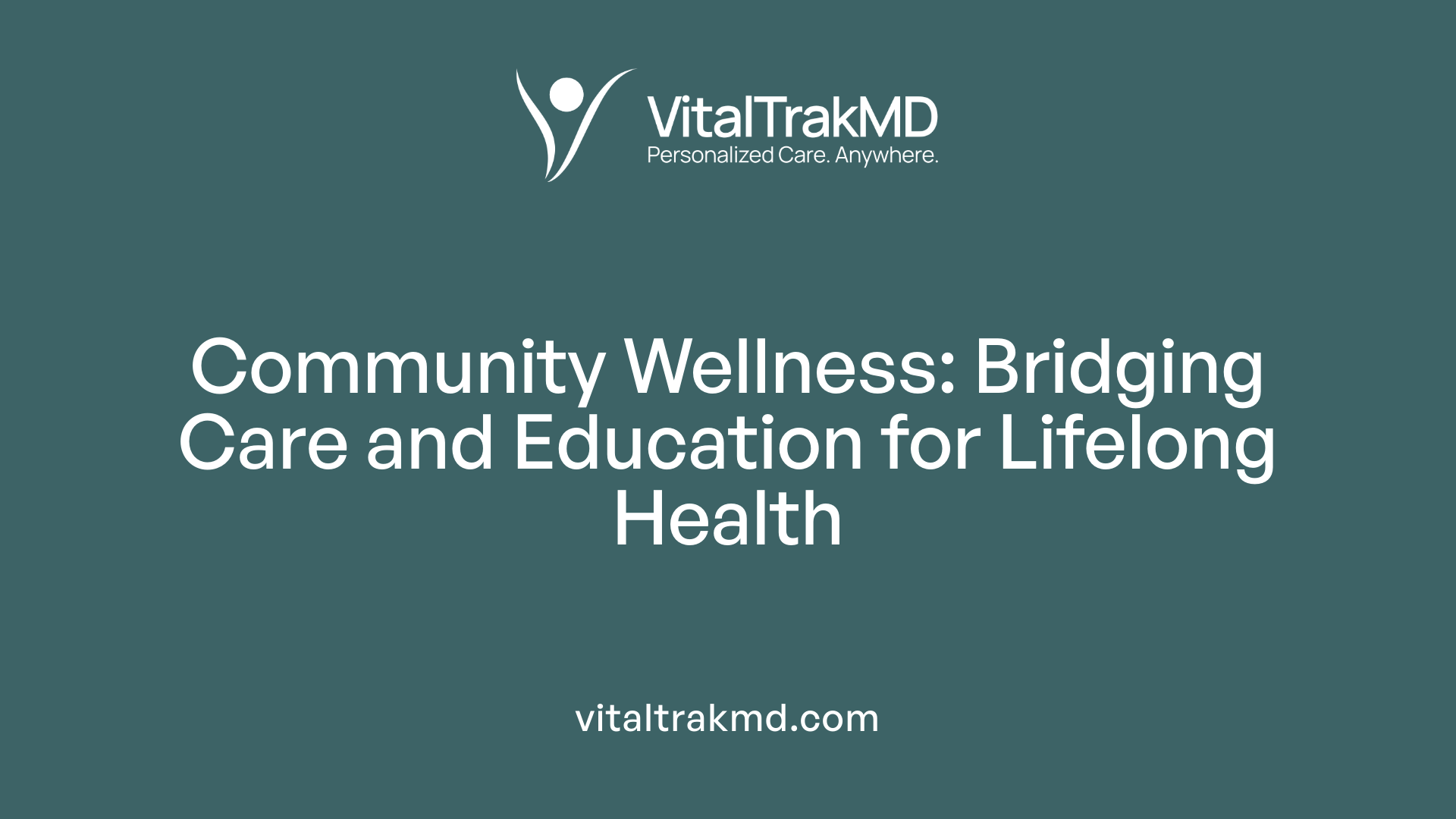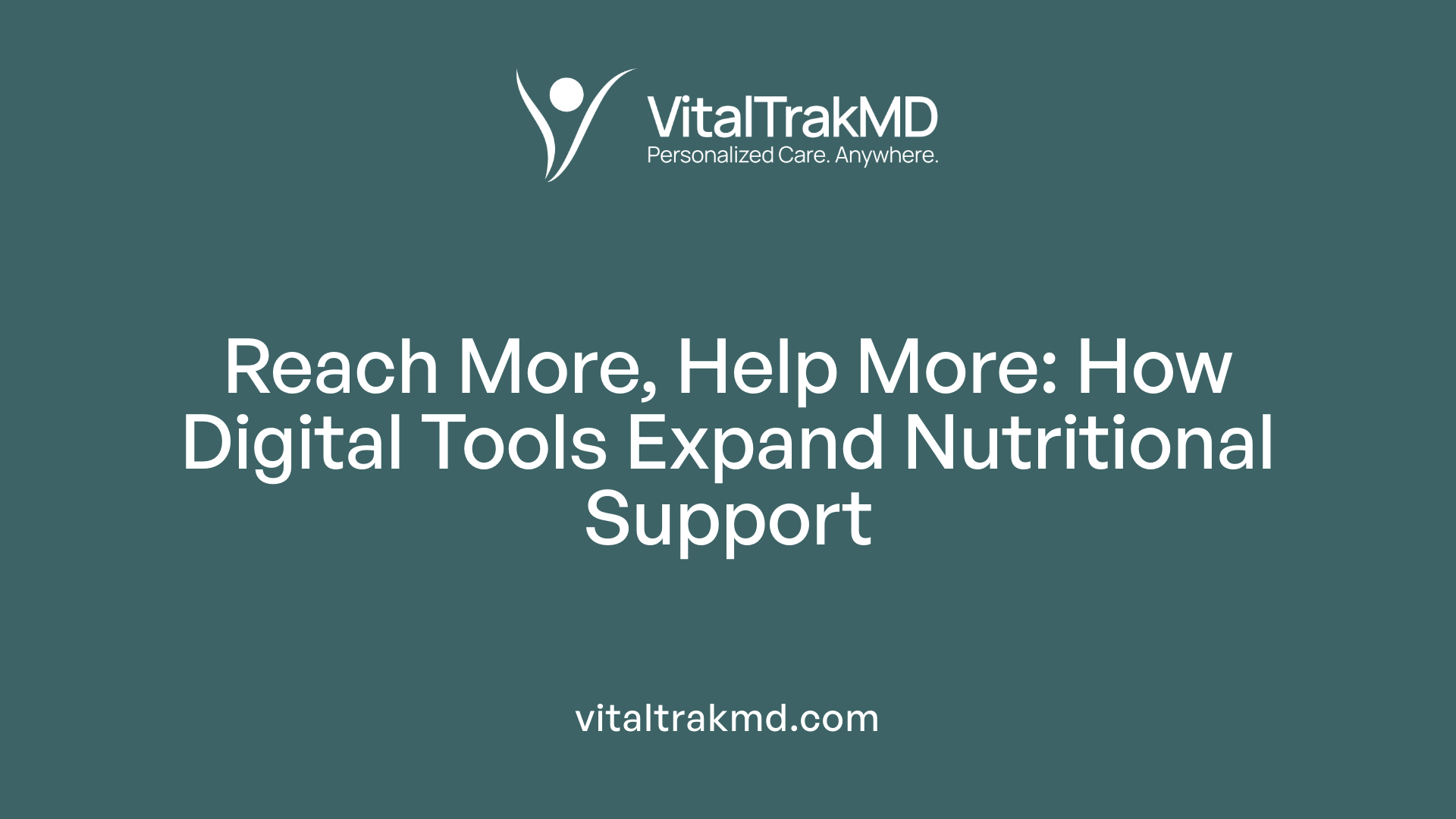How Hybrid Healthcare Promotes Nutritional Awareness for Adults

The Rise of Hybrid Healthcare in Nutritional Management
In today's evolving healthcare landscape, hybrid healthcare models—integrating digital tools with personalized, face-to-face care—are revolutionizing how adults engage with nutritional awareness and weight management. By combining technology, hands-on coaching, and community programs, these approaches address adult nutrition comprehensively and effectively, laying the groundwork for lasting wellness improvements.
Integrating Electronic Health Records and Personalized Coaching for Weight Loss

How is technology utilized in hybrid healthcare to support weight loss?
Technology serves as a cornerstone in hybrid healthcare models by integrating electronic health record (EHR) systems to streamline and coordinate weight loss interventions. These systems automate messaging to patients and facilitate lifestyle support services smoothly. Notably, wireless scales transmit patients' weight data directly into their electronic charts, enabling real-time monitoring and personalized adjustments. This seamless data sharing enhances clinical oversight and empowers patients to stay informed about their progress.
What role does personalized coaching play alongside digital tools?
Personalized coaching complements digital tools by boosting engagement and motivation. Weekly tailored emails and nurse-led coaching sessions help maintain patients’ commitment to self-weighing routines and encourage greater enrollment in available support services. This customized communication strategy nurtures a supportive relationship between patients and care providers, increasing adherence to weight management plans.
What evidence supports the effectiveness of these hybrid interventions?
Preliminary evidence from a feasibility trial involving 80 overweight or obese adults with cardiovascular risk factors highlights the potential effectiveness of integrating technology with personalized coaching. At six months, 60% of participants had lost weight, indicating promising outcomes of the hybrid approach. This balance of pragmatic data collection and patient-centered support demonstrates feasibility and early success in primary care settings.
Hybrid Educational Programs Enhance Nutritional Self-Care and Cardiovascular Health

How do hybrid educational strategies improve nutritional self-care?
Hybrid educational programs that combine the Teach-Back method with digital education create a more interactive and personalized learning experience. The Teach-Back method ensures patients accurately understand and remember instructions by encouraging them to repeat information in their own words. When integrated with digital education tools, this approach reinforces learning, accommodating different learning styles and preferences.
This combined method was shown to significantly boost nutritional self-care scores. For instance, patients' average scores improved from 11.90 at the start to 24.12 at three months post-intervention, maintaining high levels even at 12 months. Such sustained improvement highlights the effectiveness of hybrid education in promoting lasting behavioral changes.
What impact does this hybrid education have on diet quality?
The hybrid education program drastically improved diet quality among participants. Initially, almost the entire group (98.67%) had unhealthy diets. After the intervention, this dropped to 49.34%. Meanwhile, adherence to healthy diets increased from 0% to 13.33%. These changes suggest significant shifts toward healthier eating habits, which are critical for managing chronic health conditions.
Does hybrid education affect cardiovascular risk factors?
Yes, the program also led to significant reductions in important cardiovascular risk factors a full year after the intervention. Patients experienced statistically meaningful decreases in systolic and diastolic blood pressure, fasting blood glucose levels, and body mass index (BMI). These improvements reflect the positive influence of enhanced nutrition education and self-care on heart health.
Are the results of hybrid education programs sustainable in the long term?
The sustained high nutritional self-care scores and maintained improvements at 12 months highlight the long-term effectiveness and durability of this educational approach. By empowering patients with knowledge and skills through varied teaching methods, hybrid programs support a prolonged commitment to healthier lifestyles.
| Aspect | Description | Impact |
|---|---|---|
| Teach-Back method | Interactive face-to-face communication ensuring comprehension | Enhanced understanding and retention of nutritional guidance |
| Digital education | Supplementary online resources and tools | Continuous learning and accessibility |
| Nutritional self-care | Measured improvement scores from 11.90 to 24.12 | Long-term behavioral change |
| Diet quality | Reduction of unhealthy diets from 98.67% to 49.34%; healthy diets increased to 13.33% | Improved eating habits |
| Cardiovascular risk factors | Significant reductions in blood pressure, glucose, and BMI | Lowered risk of related chronic diseases |
| Longevity of results | Sustained improvements at 12 months | Demonstrated program sustainability |
Community-Based Hybrid Programs Foster Access and Long-Term Wellness

How do hybrid healthcare programs reach underserved adult populations?
Community-based programs, especially those supported by philanthropic efforts like the Milwaukee Bucks Foundation, play a vital role in reaching underserved adults. These initiatives combine medical, nutritional, and fitness services into personalized weight loss and wellness plans. By integrating virtual follow-ups with in-person visits, they create flexible, accessible support systems that meet participants where they are.
What comprehensive services are often included?
Participants benefit from a wide range of services designed to address multiple aspects of health. Comprehensive assessments include biometric measurements and lab work, which inform tailored medical weight loss plans.
The programs frequently feature medication management (including weight loss drugs under physician supervision), strength training regimens, lifestyle coaching, and continuous glucose monitoring. Mobile applications help track progress and maintain engagement, empowering individuals to actively manage their health.
How do community programs enhance nutritional awareness beyond clinical care?
Nutritional education extends beyond the clinic with engaging, community-focused offerings. Nutrition classes and culinary programs for children, such as Hannah’s Kitchen, teach practical cooking skills using healthy ingredients. Prenatal nutrition counseling and breastfeeding support groups emphasize maternal and infant wellness, embedding lifelong healthy habits early.
Additionally, access to fresh, nutritious foods is facilitated by local resources like hydroponic greenhouses producing thousands of pounds of produce annually and farmer's markets that accept multiple nutrition assistance programs. These environments foster sustained healthy eating and provide practical food security solutions.
Together, these hybrid healthcare programs create a holistic approach that integrates personalized medical care with education, behavioral support, and accessible resources to promote long-term wellness in diverse community populations.
Digital Tools and Virtual Care Expand the Reach of Nutritional Interventions

What role do digital tools play in expanding nutritional care?
Digital technology greatly enhances the accessibility and effectiveness of nutritional interventions. Video visits and remote follow-ups make it easier for patients to receive continuous care without the need for frequent in-person appointments. This convenience helps maintain engagement and adherence to weight management programs.
Mobile applications are key supportive tools in lifestyle medicine, allowing patients to self-monitor behaviors such as diet and physical activity. For example, lifestyle support services include wireless scales that transmit weight data directly to electronic health records, facilitating seamless tracking and feedback. These digital tools provide personalized coaching and real-time data, which improve motivation and outcomes.
How do hybrid models leverage education and multidisciplinary teams?
Hybrid educational programs combine digital education platforms with interactive methods like the Teach-Back technique to enhance patient understanding and self-care capabilities. Webinars hosted by programs such as the Johns Hopkins Healthful Eating, Activity & Weight Program offer the latest information on obesity and nutritional science, empowering patients and providers alike.
Collaboration among specialized healthcare teams—including physicians, nurses, dietitians, and health coaches—ensures comprehensive care tailored to individual needs. These multidisciplinary teams coordinate to provide medication management, dietary counseling, behavior change support, and ongoing follow-up, often facilitated through telehealth.
Together, digital tools and virtual care delivery models break down barriers related to location, time, and resource constraints. This integrated approach supports sustained lifestyle changes and advances effective weight management within primary care and community settings.
Economical and Pragmatic Aspects of Hybrid Weight Management Interventions

Are hybrid interventions feasible in typical healthcare settings?
Research underscores the feasibility of hybrid weight management programs within real-world primary care settings. Studies have successfully implemented pragmatic enrollment, randomization, and data collection procedures that integrate seamlessly into routine clinical workflows. This practical approach allows healthcare providers to coordinate multidisciplinary strategies efficiently, supporting patient engagement and sustainable weight loss efforts.
What are the cost considerations for supporting hybrid weight loss programs?
From an economic perspective, supporting hybrid interventions is moderately affordable. The healthcare system incurs an estimated cost of approximately US$335 per participant over six months. This level of investment balances the intensity of support services—including electronic health record integration, personalized coaching, and remote monitoring—while maintaining accessibility. Such cost efficiency contrasts with more resource-intensive treatments, positioning these programs as practical solutions for broader populations.
How do these programs align with best practices?
These hybrid interventions align closely with evidence-based guidelines. They aim for a gradual weight reduction of around 10 pounds over a ten-week timeframe. This target supports sustained lifestyle modifications through a comprehensive mix of diet, exercise, and medical monitoring. Crucially, when pharmacological treatments are involved, medical supervision remains imperative to ensure safety and optimize outcomes, reinforcing the integration of clinical oversight within these programs.
| Aspect | Details | Implication |
|---|---|---|
| Feasibility | Pragmatic approaches to enrollment and data collection in primary care | Enables scalability and integration within existing healthcare infrastructures |
| Healthcare System Cost | Approximately US$335 per participant over six months | Makes hybrid programs economically viable compared to intensive weight loss interventions |
| Program Goals | Target of 10 pounds weight loss over ten weeks | Aligns with recognized guidelines for sustainable and healthy weight reduction |
| Medical Supervision | Required when using pharmacological agents | Ensures patient safety and effective combination of medication with lifestyle changes |
The Future of Nutritional Awareness Through Hybrid Healthcare
Hybrid healthcare represents a promising evolution in adult nutritional awareness by marrying technological innovation with personalized, community-focused care. Through EHR integration, digital education blended with direct coaching, and accessible community programs, adults gain comprehensive support in adopting healthier lifestyles. These multifaceted approaches not only improve diet quality and reduce cardiovascular risks but also foster sustainable weight management with practical cost structures. As hybrid models evolve, their potential to bridge care gaps and empower adult patients in nutritional self-care will continue to grow, marking a significant advancement in public health and wellness.
References
Recent articles
Want to Feel Better and Live Healthier?
Join hundreds of patients taking control of their health with personalized care that fits their life – not the other way around.
Rated 4.8/5 by 32+ customers







